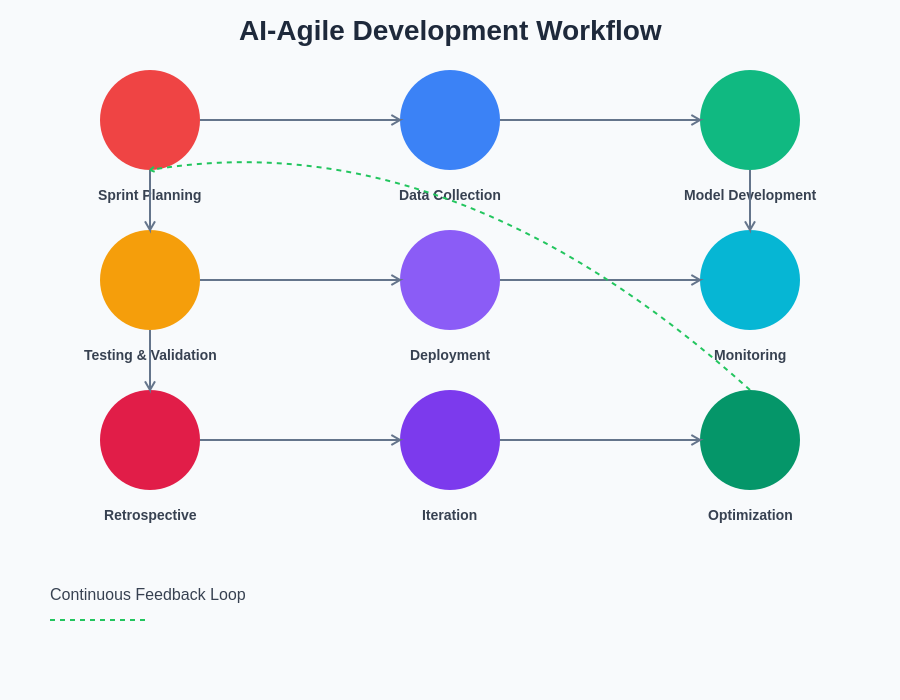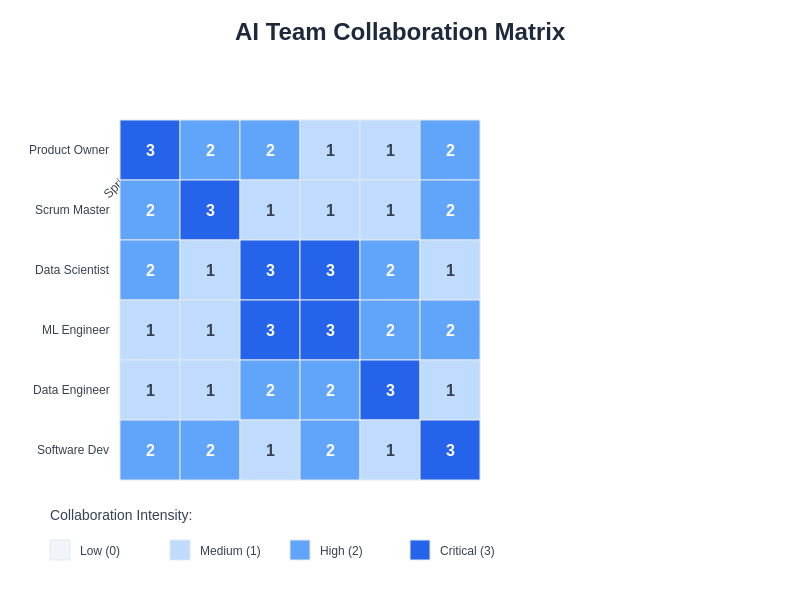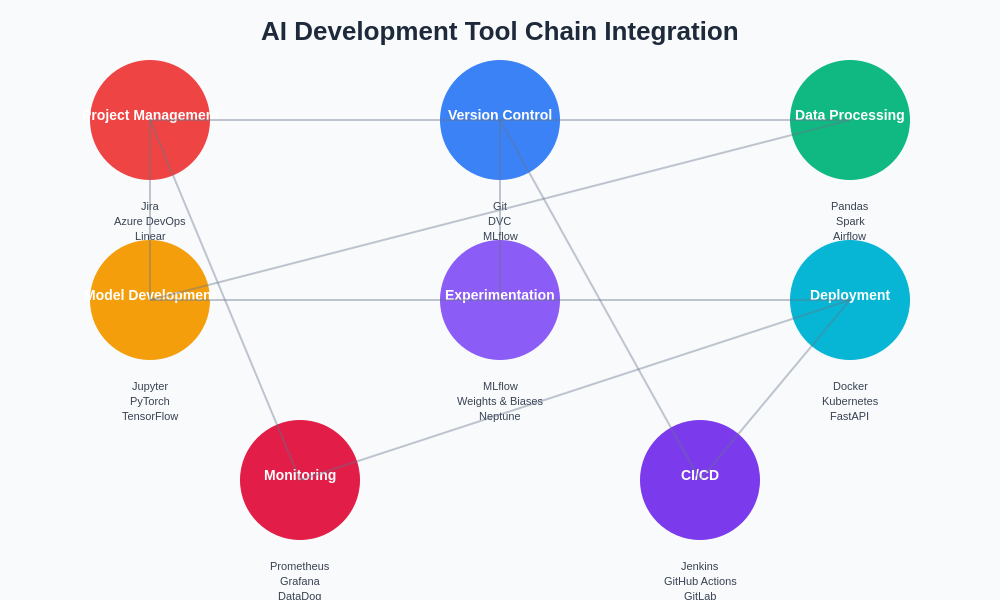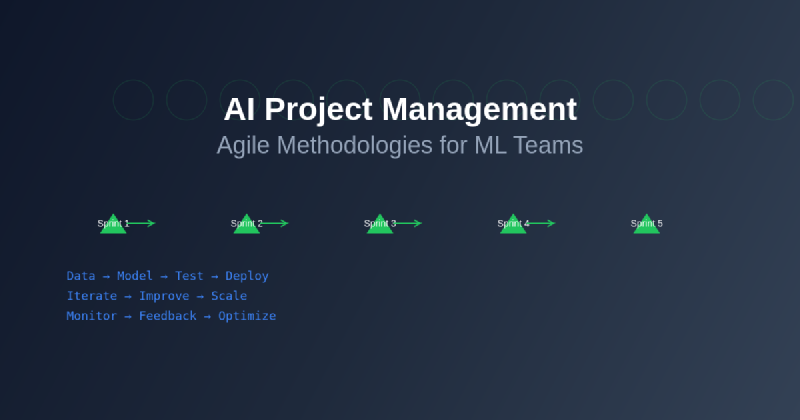The intersection of artificial intelligence project management and agile methodologies represents one of the most challenging yet rewarding aspects of modern software development. Machine learning projects possess unique characteristics that distinguish them fundamentally from traditional software development initiatives, requiring specialized approaches to project management that acknowledge the inherent uncertainty, experimentation-heavy nature, and iterative refinement processes that define successful AI implementations. The complexity of managing AI projects stems from their research-oriented nature, where hypotheses must be tested, models trained and validated, and outcomes measured against evolving success criteria that may shift as understanding deepens throughout the project lifecycle.
Stay updated with the latest AI project management trends to understand how successful teams are adapting their methodologies to meet the unique demands of machine learning development. The application of agile principles to AI project management requires a nuanced understanding of both the technical complexities inherent in machine learning workflows and the collaborative dynamics that drive successful team performance in research-intensive environments.
Understanding the Unique Nature of AI Projects
Artificial intelligence and machine learning projects differ significantly from conventional software development in several fundamental ways that directly impact project management approaches. Unlike traditional software projects where requirements can be clearly defined upfront and implementation follows predictable patterns, AI projects are inherently experimental, with success often dependent on discovering optimal solutions through iterative exploration of various approaches, algorithms, and data configurations. The uncertainty surrounding feasibility, performance metrics, and timeline estimation creates unique challenges that require project managers to embrace flexibility while maintaining focus on deliverable outcomes.
The data-centric nature of AI projects introduces additional complexity layers that traditional project management frameworks may not adequately address. Data collection, cleaning, validation, and preparation often consume substantial portions of project timelines, with quality and availability issues frequently emerging as critical bottlenecks that can significantly impact project scope and delivery schedules. Furthermore, the interdisciplinary nature of AI teams, combining data scientists, machine learning engineers, domain experts, and software developers, requires sophisticated coordination mechanisms that facilitate effective collaboration across diverse skill sets and working styles.
Adapting Agile Principles for Machine Learning Teams
The core principles of agile methodology align remarkably well with the iterative, experimental nature of machine learning development, though they require thoughtful adaptation to address the specific challenges inherent in AI projects. The agile emphasis on iterative development cycles maps naturally to the experimental workflows of machine learning, where models are continuously refined through successive rounds of training, validation, and optimization. However, the traditional notion of potentially shippable increments must be reconsidered in the context of AI projects, where intermediate deliverables may include trained models, data processing pipelines, or evaluation frameworks rather than user-facing features.
Enhance your AI project management with Claude’s advanced reasoning capabilities to streamline complex decision-making processes and improve team coordination across multidisciplinary AI development initiatives. The adaptation of agile ceremonies for machine learning teams requires careful consideration of the unique rhythms and milestones that characterize AI development workflows, ensuring that sprint planning, daily standups, and retrospectives effectively support the experimental and research-oriented aspects of machine learning work.
Establishing Effective Sprint Structures for AI Development
The design of sprint structures for AI and machine learning teams must accommodate the unpredictable nature of experimentation while maintaining the discipline and focus that characterize successful agile implementations. Traditional two-week sprint cycles may prove insufficient for meaningful progress in complex machine learning experiments that require extended periods for model training, hyperparameter optimization, and performance evaluation. Many successful AI teams have adopted flexible sprint durations that align with natural experiment cycles, allowing sufficient time for complete experimental loops while maintaining regular cadence for planning and review activities.
The definition of sprint goals in AI projects requires a sophisticated understanding of the difference between process-oriented and outcome-oriented objectives. While traditional software development can often focus on delivering specific features or functionalities, AI sprint goals may center on achieving particular performance thresholds, completing comprehensive dataset analyses, or validating specific hypotheses about model behavior. This shift in focus necessitates careful consideration of how progress is measured and communicated, ensuring that stakeholders maintain realistic expectations about the iterative nature of machine learning development.
Managing Data as a First-Class Project Asset
The centrality of data in artificial intelligence projects demands specialized approaches to data management that integrate seamlessly with agile development workflows. Unlike traditional software projects where data might be considered a secondary concern, AI projects require treating data as a first-class asset that deserves dedicated attention in sprint planning, backlog management, and team coordination activities. The complexity of data versioning, lineage tracking, and quality assurance creates unique project management challenges that must be addressed through systematic processes and tool integration.
Effective data management in agile AI projects requires establishing clear protocols for data acquisition, validation, and preparation that align with sprint boundaries and delivery milestones. Teams must develop sophisticated approaches to data quality assessment that can be integrated into definition-of-done criteria, ensuring that data-related deliverables meet established standards before being incorporated into model development workflows. The collaborative nature of data work, often involving domain experts, data engineers, and data scientists, requires careful coordination to prevent bottlenecks and ensure efficient knowledge transfer across team members.
Implementing Continuous Integration for Machine Learning Pipelines
The application of continuous integration principles to machine learning workflows represents a critical evolution in AI project management that enables teams to maintain velocity while ensuring quality and reproducibility across model development lifecycles. Traditional continuous integration focuses primarily on code integration and testing, but machine learning CI/CD must encompass model training, validation, deployment, and monitoring processes that span beyond conventional software development boundaries. The complexity of ML pipeline integration requires sophisticated orchestration of data processing, model training, evaluation, and deployment steps that must be carefully managed within agile development cycles.

The implementation of robust ML continuous integration requires teams to establish clear protocols for model versioning, experiment tracking, and performance monitoring that enable rapid iteration while maintaining scientific rigor and reproducibility. This systematic approach to ML pipeline management ensures that agile development practices can be effectively applied to machine learning projects without compromising the experimental nature and quality requirements that characterize successful AI implementations.
Balancing Research and Development Objectives
One of the most challenging aspects of managing AI projects using agile methodologies involves balancing the tension between research-oriented exploration and product-focused development objectives. Machine learning projects often require significant investment in research activities that may not yield immediate deliverable outcomes but are essential for long-term project success. Agile project management for AI teams must accommodate both exploratory research sprints that focus on hypothesis generation and validation, as well as development-focused sprints that concentrate on implementing and optimizing proven approaches for production deployment.
Leverage Perplexity for comprehensive research to support your team’s research activities with AI-powered information gathering and analysis capabilities that complement agile development workflows. The integration of research and development objectives requires careful sprint planning that allocates appropriate time and resources to both exploration and implementation activities while maintaining clear communication with stakeholders about the different types of outcomes expected from each phase of work.
Measuring Success in Agile AI Projects
The measurement of progress and success in AI projects using agile methodologies requires a sophisticated understanding of the multiple dimensions along which machine learning initiatives can be evaluated. Traditional agile metrics such as velocity, burn-down charts, and feature completion rates may not adequately capture the nuanced progress that characterizes successful AI development workflows. Teams must establish comprehensive measurement frameworks that encompass model performance metrics, data quality indicators, experiment completion rates, and stakeholder satisfaction measures that provide holistic views of project health and progress.
The establishment of meaningful success metrics for AI projects requires close collaboration between technical teams and business stakeholders to ensure that measurement frameworks align with both technical capabilities and business objectives. Model performance metrics such as accuracy, precision, recall, and F1 scores must be contextualized within business impact frameworks that translate technical achievements into understandable business value propositions. This alignment between technical and business metrics ensures that agile development efforts remain focused on delivering outcomes that contribute to organizational objectives rather than optimizing purely technical measures that may not correlate with business success.
Risk Management in Agile AI Development
The inherent uncertainty and experimental nature of artificial intelligence projects creates unique risk profiles that require specialized approaches to risk identification, assessment, and mitigation within agile development frameworks. Traditional software development risks such as scope creep, technical debt, and resource constraints remain relevant for AI projects, but they are compounded by additional risks related to data quality, model performance variability, regulatory compliance, and ethical considerations that may not be immediately apparent during initial project planning phases.
Effective risk management for agile AI projects requires establishing systematic approaches to risk identification that account for the multi-dimensional nature of machine learning development challenges. Teams must develop sophisticated risk assessment frameworks that consider technical risks related to model performance and scalability, operational risks associated with data pipeline reliability and model deployment, and business risks stemming from changing requirements and competitive pressures. The integration of risk management activities into regular agile ceremonies ensures that potential issues are identified and addressed proactively rather than reactively.
Team Composition and Role Definition
The success of agile methodologies in AI project management depends heavily on establishing clear role definitions and communication patterns that facilitate effective collaboration across the diverse skill sets typically required for machine learning initiatives. AI teams often include data scientists, machine learning engineers, software developers, data engineers, domain experts, and product managers, each bringing unique perspectives and working styles that must be harmonized within agile development frameworks. The interdisciplinary nature of AI teams requires careful attention to role boundaries and collaboration mechanisms that enable efficient knowledge sharing and decision-making processes.
The evolution of traditional agile roles to accommodate AI project requirements involves expanding the responsibilities of product owners to include data stewardship and model performance oversight, while scrum masters must develop familiarity with machine learning workflows and experimental processes. The introduction of specialized roles such as ML engineers and data engineers requires careful integration into existing agile team structures, ensuring that new team members understand their responsibilities within sprint cycles and contribute effectively to collective team objectives.

The complexity of modern AI teams necessitates sophisticated collaboration frameworks that ensure effective communication and knowledge transfer across diverse disciplines while maintaining the agility and responsiveness that characterize successful agile implementations.
Stakeholder Communication and Expectation Management
The management of stakeholder expectations in agile AI projects represents a critical success factor that requires specialized communication strategies acknowledging the experimental and iterative nature of machine learning development. Traditional project management often focuses on delivering predetermined features within established timelines, but AI projects require stakeholders to understand and accept the inherent uncertainty surrounding feasibility, performance outcomes, and delivery schedules that characterize machine learning initiatives. Effective communication strategies must balance transparency about project risks and uncertainties with confidence in team capabilities and methodological approaches.
The development of stakeholder communication frameworks for AI projects requires careful consideration of different audience needs and technical backgrounds, ensuring that progress reports and project updates are accessible to both technical and non-technical stakeholders while maintaining accuracy and completeness. Regular demonstration of intermediate results, model performance improvements, and data quality enhancements helps maintain stakeholder engagement and confidence while providing opportunities for feedback and course correction that align with agile principles of iterative improvement and stakeholder collaboration.
Quality Assurance in Machine Learning Development
Quality assurance for machine learning projects extends far beyond traditional software testing to encompass data quality validation, model performance verification, and ethical compliance assessment that must be integrated into agile development workflows. The complexity of ML quality assurance requires systematic approaches to testing that address multiple dimensions of model behavior including accuracy, fairness, robustness, and interpretability across diverse operational conditions and data distributions. These comprehensive quality requirements must be incorporated into definition-of-done criteria and acceptance testing frameworks that support agile delivery cycles.
The implementation of effective quality assurance processes for ML projects requires close collaboration between data scientists, quality assurance specialists, and domain experts to establish comprehensive testing frameworks that validate both technical performance and business relevance of model outputs. Automated testing pipelines must be developed to support continuous integration workflows while manual testing processes address edge cases and ethical considerations that may not be easily captured through automated approaches. This multi-layered approach to quality assurance ensures that agile development velocity is maintained without compromising the reliability and trustworthiness of deployed AI systems.
Scaling Agile Practices Across Multiple AI Projects
Organizations developing multiple concurrent AI projects face unique challenges in scaling agile practices across teams while maintaining consistency and enabling knowledge sharing between related initiatives. The specialized nature of machine learning development creates opportunities for significant synergies between projects, particularly in areas such as data infrastructure, model architectures, and evaluation frameworks that can be shared across teams to accelerate development and improve quality outcomes. However, realizing these synergies requires sophisticated coordination mechanisms that preserve team autonomy while facilitating effective collaboration and resource sharing.
The development of organizational frameworks for scaling agile AI development requires establishing centers of excellence that provide guidance and support to individual teams while respecting the unique requirements and constraints of specific projects. These frameworks must address technical standardization opportunities, such as common data processing pipelines and model deployment infrastructures, while maintaining sufficient flexibility to accommodate diverse project requirements and experimental approaches that drive innovation and competitive advantage.
Technology Integration and Tool Chain Management
The effective implementation of agile methodologies in AI project management requires careful integration of specialized tools and technologies that support machine learning workflows while maintaining compatibility with traditional software development practices. The ML technology stack typically includes specialized platforms for data processing, model development, experiment tracking, and deployment that must be seamlessly integrated with conventional project management tools such as issue tracking systems, version control platforms, and continuous integration frameworks. This integration complexity requires thoughtful tool chain architecture that supports both technical productivity and project management visibility.

The selection and integration of AI development tools within agile frameworks must consider both current project needs and future scalability requirements, ensuring that technology investments support long-term organizational objectives while enabling immediate productivity improvements that justify implementation costs and learning investments.
Continuous Improvement and Learning Culture
The experimental nature of artificial intelligence development creates natural alignment with agile principles of continuous improvement and learning, though the application of these principles to AI projects requires specialized approaches that account for the unique characteristics of machine learning workflows. Traditional agile retrospectives must be expanded to include systematic analysis of experimental outcomes, model performance trends, and data quality issues that provide insights for improving future development cycles. The integration of scientific methodology with agile practices creates opportunities for enhanced learning and improvement that extend beyond conventional software development optimization.
The development of learning-oriented culture within agile AI teams requires establishing systematic approaches to knowledge capture and sharing that enable teams to build upon previous experiments and avoid repeating ineffective approaches. This learning infrastructure must encompass both technical knowledge related to model architectures and algorithms as well as process knowledge about effective collaboration patterns and project management approaches that contribute to team success. The systematic capture and application of lessons learned across projects enables organizations to continuously improve their AI development capabilities while maintaining agile responsiveness to changing requirements and opportunities.
Future Evolution of AI Project Management
The continued evolution of artificial intelligence technologies and methodologies will undoubtedly influence the future development of project management approaches for ML teams, requiring ongoing adaptation of agile principles and practices to address emerging challenges and opportunities. The increasing sophistication of automated machine learning platforms, improved data processing capabilities, and enhanced model deployment infrastructures will likely reduce some current complexities while introducing new challenges related to system integration, performance optimization, and ethical governance that will require specialized project management approaches.
The integration of emerging technologies such as automated experiment design, intelligent resource allocation, and predictive project analytics promises to enhance the effectiveness of agile methodologies for AI project management while maintaining the human-centered collaboration and iterative improvement principles that characterize successful agile implementations. The future landscape of AI project management will likely feature increasingly sophisticated tool integration, enhanced automation of routine tasks, and improved support for the creative and experimental aspects of machine learning development that require human expertise and judgment.
The successful adaptation of agile methodologies to artificial intelligence project management represents a critical capability for organizations seeking to leverage machine learning technologies effectively while maintaining development velocity and quality standards. The unique challenges and opportunities presented by AI development require thoughtful evolution of traditional agile practices rather than wholesale replacement, ensuring that the proven benefits of iterative development, stakeholder collaboration, and continuous improvement are preserved while addressing the specialized needs of machine learning teams and projects.
Disclaimer
This article is for informational purposes only and does not constitute professional advice. The views expressed are based on current understanding of AI project management practices and agile methodologies. Organizations should conduct their own assessment and consider their specific requirements when implementing project management approaches for AI and machine learning initiatives. The effectiveness of different methodologies may vary depending on project complexity, team composition, and organizational context.
